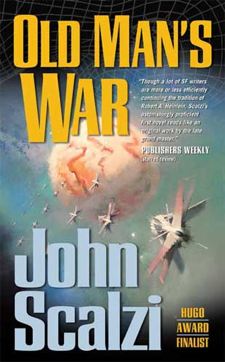I did two things on my seventy-fifth birthday. I visited my wife’s grave. Then I joined the army.
The horror of war is what it does to civilians. The pity of war is what it does to soldiers: the young lives lost and young bodies maimed. What might it be like to grow old, to have had your life, and then to be given a second life, and a second youth, as a soldier? Even without the offer of a third life as a civilian colonist if you—improbably—survive your stint, it’s a deal many would take.
This is one of several intriguing premises of Old Man’s War. Two hundred years from now, humanity has had the FTL “skip drive” for over a century, and spread far. Extraterrestrial humanity’s government is the Colonial Union. The universe is crawling with likewise expanding intelligent species, many of which covet the same real estate. A few are allies, or neutral. Some of the others quite like humans, for the taste.
Hence, the Colonial Defense Force, stomping the bugs and ensuring humanity’s continued existence. The Colonial Union monopolises access to space, and its Quarantine Laws mean that becoming a colonist or a soldier is a one-way ticket. People from overpopulated countries can leave Earth on easy terms. For U.S. citizens, the only way out is to sign up for the CDF. The one qualification is reaching the minimum age: seventy-five.
John Perry is one of a batch of a thousand or so doddery elders who go up the space elevator from Nairobi to Colonial Station. He makes friends, becomes a citizen, and ships out. On the starship he learns just what his new life involves. It’s not all bad. Then comes boot camp, combat, disillusion, more combat, startling revelations, harrowing reversals, victory, promotion—and the small but glowing prospect of an unexpected happy ending, in the next life.
The story’s footwork is smooth and fast, like the skip drive. It’s only when we fall out of it that we notice how many questions are unanswered. The narrator is telling the truth as he sees it—but casually dropped clues may make us query the CDF’s version of it. How odd, after all, that all those rampaging aliens didn’t show up long before humanity skipped out to meet them….
Well-versed science fiction readers will, of course, recognise where the book’s DNA comes from (and for other readers, there’s Scalzi’s acknowledgement of his debts to Heinlein at the back). But it’s more than just a clone of Starship Troopers, with the odd plasmid of recombinant material from Gordon Dickson’s Naked to the Stars and Joe Haldeman’s The Forever War. It’s been genetically enhanced, and there’s a computer running in its head.
Unlike these books, however, it’s not fundamentally about war, or even the ethics of interspecies competition. Not is it about current politics. There are no harangues, and no obvious parallels to the present. (Scalzi tosses a couple of chunks of red meat to his right, but the tone throughout is liberal.) It’s about youth and age, love and loss, and it makes you feel the sting of these even as you wonder if the quickness of Scalzi’s hand deceives your eye.
One more thing, and not the least: Old Man’s War also differs from its predecessors in having some good, dirty laughs.
Ken MacLeod is the author of the recent science fiction novel The Restoration Game, as well as the Fall Revolution series and numerous other works. He has received the Prometheus award, British Science Fiction Association award, and been twice nomianted for the Arthur C. Clarke award.










